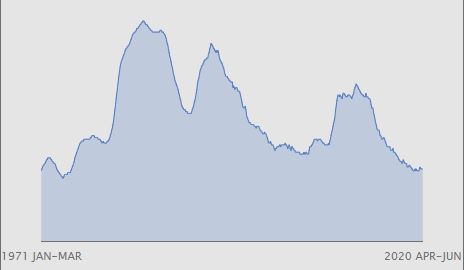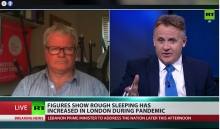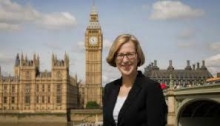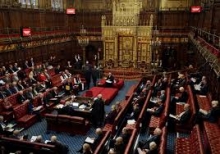Work TV
Watch our TV Channel dedicated to the ‘World of Work’. Explore our video library for informative videos featuring career opportunities at leading companies, franchising opportunities, further education and recruitment professions and their services.
Simon Collyer
ONS Unemployment Figures Are Masking The Real Picture
UNEMPLOYMENT - Early indicators for July 2020 suggest that the number of employees in the UK on payrolls is down around 730,000 compared with March 2020. Flows analysis suggests that the falls in May, June and July are mainly because of fewer people moving into payrolled employment. People out of work are largly being classesed as economically inactive. “There are over 8 million people, that's 20% of the workforce aged between 16 and 64 in the UK who are economically inactive. However that figure was taken earlier in the year.
Zero-hour contracts have topped a million as benefits surge.
Survey data show employment is weakening and unemployment is largely unchanged because of increases in economic inactivity, with people out of work but not currently looking for work.
The decrease in employment on the quarter was the largest quarterly decrease since May to July 2009 with both men and women seeing decreases on the quarter. The quarterly decrease in employment was also driven by workers aged 65 years and over, the self-employed and part-time workers. Meanwhile full-time employees largely offset the decrease.
Hours worked has continued to fall reaching record lows both on the year and on the quarter.
A large number of people are estimated to be temporarily away from work, including furloughed workers; approximately 7.5 million in June 2020 with over 3 million of these being away for three months or more. New analysis shows that the youngest workers, oldest workers and those in manual or elementary occupations were those most likely to be temporarily away from paid work during the coronavirus (COVID-19) pandemic. There were also around 300,000 people away from work because of the pandemic and receiving no pay in June 2020.
Vacancies are showing increases in the latest period, driven by the smaller businesses, some of which are reporting taking on additional staff to meet COVID-19 guidelines.
The Claimant Count reached 2.7 million in July 2020, an increase of 116.8% since March 2020.
Pay fell for all measures in the three months to June 2020. However, for the sectors of wholesaling, retailing, hotels and restaurants and construction where the highest percentage of employees returned to work from furlough, there is a slight improvement in pay growth for June 2020.
- April to June figures show weakening employment rates, with numbers of self-employed and part-time workers seeing reductions; despite these falls, unemployment was not rising, because of increases in people out of work but not currently looking for work; the reduction in total hours worked is a record both on the year and on the quarter, with the whole period covering a time since the introduction of coronavirus measures.
- Early estimates for July 2020 from Pay As You Earn (PAYE) Real Time Information (RTI) indicate that the number of payroll employees fell by 2.5% (730,000) compared with March 2020.
- The Claimant Count increased in July 2020, reaching 2.7 million; this includes both those working with low income or hours and those who are not working.
- Vacancies in the UK in May to July 2020 were at an estimated 370,000; this is 10% higher than the record low in April to June 2020.
- The three months to June 2020 saw strong falls in pay; total nominal pay fell by 1.2% on the year and regular nominal pay fell by 0.2% (the first negative pay growth in regular nominal earnings since records began in 2001).
ABC Note: The economically inactive are defined as people who are not in employment or unemployed. There are many reasons why an individual may be inactive, for example, they might be studying, looking after family or long-term sick. Or furloughed.
ABC Comment, have your say below:

DOWNLOAD BELOW: House of Commons Briefing Paper:

ABC Founder on RT TV Today - Simon Collyer Discusses the Figures And Explains Why He Thinks It's Going To Get Worse...
RT TV - Simon Collyer, ABC founder has just appeared on RT TV talking about the Renter's Reform Bill and a potential homelessness pandemic.
We will have more on this appearance shortly and we hope a clip.
Special thanks to RT TV producer Bouchra Bouyoub, for having us on with presenter Bill Dod. Very pleased to get this debate started.

Image: RT TV presenter Bill Dod.
ABC Comment, have your say below:

Government Refuses to Extend the Furlough Scheme as Job Layoffs Escalate
JOB LOSSES - It’s been confirmed that travel money firm Travelex has agreed a deal to stay in business, but at a cost of cutting more than 1,300 jobs in the UK - putting at risk its workforce at its two sites in Scotland at Glasgow airport and Aberdeen airport.
The latest cuts come as around 10,000 job losses were announced this week at leading companies including WH Smith, Pizza Express, Hays Travel, Dixons Carphone, M&Co, LGH, DW Sports, Aecom, Prestwick Airport, William Hill, and Sodexo.
The government has so far refused to extend the furlough scheme. On August 23rd the moritoriumn on evictions ends.

Image: Job losses mount in a troubled economy.
ABC Comment, have your say below:

Pensioners Switched-Off - Simon Collyer Appears on the Sadie Nine Show on BBC Essex, Discussing TV Licences
TV LICENCES - Simon Collyer, ABC founder, appeared on the Sadie Nine show on BBC Essex radio this morning. Our topic of discussion - the government ending free TV licences for pensioners over the age of 75, other than those receiving Pension Credit and a few other exempt categories.
From 1 August 2020, there will be a new scheme. Under the new scheme, anyone aged 75 or over receiving Pension Credit will be eligible to apply for a free TV Licence, paid for by the BBC.
Pension Credit can be in the name of the licence holder, or their partner's name if they are a couple living at the same address. Over-75s will continue to get free TV licences for a further two months as a result of the coronavirus. They were originally going to be scrapped on 1 June, but this was pushed back until 1 August.
As you can appreciate many pensioners are very annoyed at having to find £157.00 per annum, to watch the 'goggle box'.
Who is exempt from TV Licence?
People who are aged 75 or over and receive Pension Credit. People who are blind (severely sight impaired). People who live in qualifying residential care and are disabled or over 60 and retired. For businesses that provide units of overnight accommodation, for example, hotels and mobile units.
If you are currently paying for a licence, please continue to make your payments, as usual, to stay covered says the BBC. You can also renew your licence now if you need to.
If you previously had a free over 75 TV Licence, please sign in to review your options and get set up with a new licence.
If you’re not covered and need a TV Licence, please buy a licence now.
If you are eligible for a free over 75 TV Licence
Free over 75 TV Licences are only available to households that receive Pension Credit.
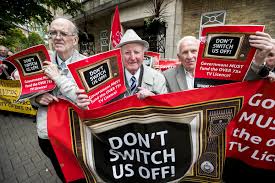
Image: Irate pensioners face being switched-off by the government.
Need to apply for Pension Credit?
If you don’t have Pension Credit but think you may be eligible, you can find out more at www.gov.uk/pension-credit. You can make a claim for Pension Credit online or by calling 0800 99 1234 (opening hours 9.30 am-6.00 pm).
If you live in Northern Ireland please visit www.nidirect.gov.uk/pension-credit or call the Northern Ireland Pension Centre on 0808 100 6165.
Previously covered by a free over 75 TV Licence?
If you had a free licence up to 31 July 2020 and you or your partner at the same address are receiving Pension Credit, please sign in to apply for your next free licence.
Never been covered by a free over 75 TV Licence?
If you think you’re eligible for a free licence but have not held a free licence before, call 0300 790 6117 and speak to one of our advisors to request an application form. (Our lines are open between 8.30 am and 6.30pm, from Monday to Friday.)
Once you receive your application form, you’ll need to complete and return it. Please include a copy of your Pension Credit and proof of age documents. This could be a letter from the Department for Work and Pensions or The Pension Service. In Northern Ireland, this could be a letter from the Department for Communities or the Northern Ireland Pension Centre.
Once we’ve received your application it may take a few weeks to process. If there are any problems we’ll write to let you know. We may also call you if you have given us your phone number.
Refunds
If you’ve been paying for a licence when you were eligible for a free over 75 TV Licence, you may be due a refund. We will process this as part of your application.
If you live in the Channel Islands or the Isle of Man
The BBC is consulting in the Isle of Man and the Bailiwicks of Jersey and Guernsey before deciding the future arrangements for TV Licences for older people there. We’ll be in touch when a decision has been made. Until then, existing free licences will be in place until 31 December 2020. New licences will also run until that date.
Applying for a free over 75 TV Licence before you reach 75
If you already receive Pension Credit, you can apply for your free over 75 TV Licence when you are 74 years old. We will issue you a short-term paid-for licence to cover you until your 75th birthday.
To request an application form, please call 0300 790 6117 and speak to an advisor.
Have your circumstances changed?
If the licence holder has died
If a licence holder has passed away, please contact us to let us know who we should transfer the licence to. If you lived at the same address, you’ll be covered until the current licence expires.
If you’re eligible, you can then apply for a new free licence. If not, you’ll need to buy a new licence when the current one expires.
If you’ve moved home or into a residential care home
You can move your licence to your new address by updating your details online.
If you’re 75 or over and live in a residential care home, you may be covered by an ARC (Accommodation for Residential Care) TV Licence and won’t have to pay for a licence even if you don’t receive Pension Credit. You may also get a free licence if you live somewhere that used to have an ARC licence (“preserved rights”). Please speak to your care home administrator.
Thanks to TV Licencing for this information.
During the radio interview Simon Collyer, ABC founder, suggested you check your state pension. PLEASE click here to check yours: https://www.gov.uk/check-state-pension

Image: BBC Essex and the Saide Nine show:
ABC Comment, have your say below:

Landlords Seeking Possession Must Submit a Reactivation Notice
EVICTIONS - From 23rd August, evictions will restart with Civil Procedure Rules. It is unclear how these will work in practise will work in practice and provide any protection for renters struggling to pay rent due to COVID-19 says Generation Rent.
Generation Rent highlights:
- The new rules will require landlords seeking possession of their property to submit a ‘reactivation notice’.
- In this notice, they must set out any relevant information about a tenant’s circumstances, including whether coronavirus has affected their ability to pay rent or if the tenant is vulnerable.
- Judges will be able to adjourn proceedings if the information is not provided.
- However, if the information is provided, judges will have no legal means to prevent Section 21 ‘no-fault’ evictions, or Section 8 evictions for rent arrears built up due to coronavirus, despite evidence that the tenant has been affected by the pandemic or is vulnerable.
- Courts will also be able to spread out hearing dates, to ensure that they are appropriately distanced.
Generation Rent is concerned that these adjustments alone will not protect vulnerable renters from eviction. The questions they have asked the Government can be read here.

Image: Housing Secretary Robert Jenrick.
Alicia Kennedy comments: “In March, Housing Secretary Robert Jenrick pledged that “no renter who has lost income due to coronavirus will be forced out of their home.” However, these rules raise more questions than answers. They offer little comfort to renters across the country who are terrified about losing their home because they can’t pay their rent due to COVID-19.
“The Civil Procedure Rules state that landlords must provide information on a tenant’s circumstances to avoid delays, but as long as information is provided, it appears evictions will go ahead.
“These rules alone are worthless and will not help the vast majority of renters who are at risk of losing their home, as judges will not have the legal powers necessary to prevent Section 21 no-fault evictions or Section 8 evictions for rent arrears built up during the pandemic.
Landlords however are claiming:
Responding to a series of parliamentary questions, Lord Greenhalgh, a Minister at the Ministry for Housing, Communities and Local Government has said that from the 24th August “the courts will begin to process possession cases again”.

Image: Lord Greenhalgh, a Minister at the Ministry for Housing.
By this date it will have been five months since the ban on evictions was originally put in place. This was to provide more security for renters during the COVID-19 pandemic. However, the NRLA has recently reported that this ban has also caused more of a struggle to protect victims of domestic abuse.
The Minister argued that this would be “an important step towards ending the lockdown and will protect landlords’ important right to regain their property.” He reiterated, however, that work is ongoing to ensure “the most vulnerable tenants can get the help they need when possession cases resume.”
He also has confirmed that under plans to end Section 21 repossessions as part of the Renters’ Reform Bill, Ministers want to ensure that “landlords are able to swiftly and smoothly regain their property through the courts where they have a legitimate reason to do so.”
Ben Beadle, Chief Executive of the National Residential Landlords Association, said: “The Minister’s comments provide greater certainty for the rental market. We continue to work hard with landlords and tenants to sustain tenancies wherever possible. In the vast majority of cases, this is happening.
“It is vital however that swift action can be taken against those tenants committing anti-social behaviour or domestic violence. We are calling also for priority to be given to cases where possession orders were granted prior to lockdown or where rent arrears have nothing to do with the COVID pandemic.”
David Cox, Chief Executive of ARLA Propertymark, has also commented on the announcement: “We’re very pleased to hear that from 24th August courts will be re-opening and can begin to process the backlog of possession cases.
“We have previously expressed our concern to the Secretary of State for Justice that there could be as many as 62,000 ‘business as usual’ landlord possession claims to be processed across England and Wales so having clarity on when these can be handled is extremely encouraging for landlords and the sector.”
“Coronavirus has created a rent debt crisis, which is set to get worse as the furlough scheme is wound down. Renters who have been left out of Government support schemes have now been left in the dark.
“The Government must provide clarity on how renters affected by coronavirus will be protected from eviction and homelessness.”
ABC Comment, have your say below:

New Support Service For Apprentices Who Have Lost Their Jobs Due to Covid-19
GOVERNMENT – A new support service is being launched to help apprentices who have lost their jobs due to the Covid-19 outbreak to find new opportunities.
A new online and telephone support service for apprentices who have lost their jobs during the Covid-19 outbreak has been launched today by Gillian Keegan, Apprenticeships and Skills Minister (1 August).
The new Redundancy Support Service for Apprentices (ReSSA) will ensure apprentices can access local and national services that can provide financial, legal, health and wellbeing support, and help them to find a new job should they need it. Apprentices can also search and apply for other available apprenticeship opportunities across the country.
From today, employers large and small are also being encouraged to take advantage of generous new cash incentives designed to create more high quality apprenticeship opportunities so more people, particularly young people, can kick-start an exciting and rewarding career.
As part of the Government’s Plan for Jobs, employers are being offered £2,000 for each new apprentice aged under 25 they hire, and £1,500 for each new apprentice they hire aged 25 and over, up to the 31st January 2021. This includes taking on an apprentice who has been made redundant.

Image: Gillian Keegan MP.
Gillian Keegan, Minister for Apprenticeships and Skills said:
Covid-19 has had a big impact on business and the jobs market, and we know that some apprentices have lost their jobs or are facing redundancy as a result.
We are taking unprecedented steps through our Plan for Jobs to protect, support and create jobs, with a clear focus on ensuring people have the right skills to get into work and progress. This includes creating more high quality apprenticeship opportunities to help get our economy moving.
Our new Redundancy Support Service for Apprentices will make sure apprentices who have lost their jobs can get the help and support they need to get back on track and on the path to a new career.
Employers who have apprenticeship opportunities up for grabs and who are willing to take on a redundant apprentice are also being urged to sign up to the new service to advertise their vacancies. Apprentices who are looking for new opportunities can then see what is on offer, get support to apply and kick-start a new career.
The new cash incentives for employers are in addition to the existing £1,000 payment for new 16-18 year-old apprentices, and those aged under 25 with an Education, Health and Care Plan.
To support people, particularly young people, affected by Covid-19 the Government has also announced a range of support including:
£111 million boost to triple the number of traineeships available across England – the largest-ever expansion of traineeships – to help make sure more 16-24 year olds have the skills, experience and confidence they need to enter the world of work.
A new £2 billion Kick-start Scheme to create hundreds of thousands of new, fully subsidised jobs for young people across the country.
£17million is being invested to increase participation in our sector-based work academies, to upskilling job seekers to fill locally identified vacancies.
A Job Retention Bonus – a one-off payment of £1,000 to UK employers for every furloughed employee who remains continuously employed through to the end of January 2021.
The Government is providing £111 million to support school and college leavers at risk of becoming unemployed to do a fully funded optional extra year of study.
The National Careers Service is also providing high quality impartial advice and guidance to more young people and adults who have been affected by coronavirus.
ABC Note: Gillian Keegan is a British Conservative Party politician who has been the Member of Parliament for Chichester since the 2017 general election.

Job For the Girls - Thérèse Coffey Appoints Sarah Newton Cons MP as Chair of the Health and Safety Executive (HSE) Board.
DWP CHANGES - The Department for Work and Pensions has appointed Sarah Newton as Chair of the Health and Safety Executive (HSE) Board.
The appointment commences on 1 August 2020 and is a 5 year posting. She will replace Martin Temple at the conclusion of his term.
Secretary of State for Work and Pensions Thérèse Coffey said:
I’m pleased to welcome Sarah to this important role and look forward to working with her.
Her insight and experience will be huge assets as we work to safely resume everyday life across the country, helping to build confidence within business and workers as we get Britain back into work.
I would also like to thank Martin for his dedication throughout his service over the last five years.
Sarah Newton said:
As we move out of the nationwide lockdown and learn to live with Covid 19, the role of the HSE has never been more critical. I am looking forward to working with the HSE non executive and executive leadership team, tackling the challenges, building on the strengths of the organisation and working in partnership with employers, unions, trade associations, professional bodies, academics and others, enabling Great Britain to work safely and well.
About Sarah Newton
Sarah Newton was Minister of State at the Department for Work and Pensions from November 2017 to March 2019. She was Parliamentary Under Secretary of State at the Home Office from 17 July 2016 to 9 November 2017. She was elected Conservative MP for Truro and Falmouth in May 2010. Sarah served as Assistant Government Whip from May 2015 until July 2016. Sarah was previously a councillor on Merton Council. During her time in Wimbledon, she served as the head of Friends of Cannizaro Park.
She has served on a wide range of boards and is currently a Non-Executive Director of the Royal Cornwall Hospitals NHS Trust. Sarah was a marketing officer for IBIS, Citibank and American Express. After working for American Express for 4 years she became Director of Age Concern England. Sarah is also Founder and Initial Director of the International Longevity Centre.
ABC Comment, have your say below:

One Fifth of Families Renting From Private Landlords Fear Being Made Homeless Says Shelters Research
HOMELESSNESS - New research from Shelter shows that nearly a fifth of private renting parents – 458,000 adults – are more concerned that their family will become homeless as a result of the coronavirus pandemic, and a third feel more negative about their housing situation in the long-term.
Polling that Shelter commissioned, carried out by YouGov, reveals the lengths hard-pressed families are going through to keep a roof over their heads during the pandemic. During lockdown:
- 49,000 people resorted to using food banks
- 429,000 people were forced to cut back on food to help pay their rent
- 550,000 people took on debt (e.g. overdrafts, credit cards, payday loans and borrowing money from the bank) to help pay their rent
Within this context, the government’s recent string of policy announcements for the housing sector – a cut to stamp duty and an extension of Permitted Development Rights – are answers to the wrong questions says Shelter.
As the government looks to ‘build back better’, it should level up and build a better future by rolling out a housebuilding programme that will provide everyone with a safe home as a foundation, while boosting the economy and saving jobs say the organisation.

ABC Comment, have your say below:

Radical Reform of Universal Credit Is Needed To Protect The Most Vulnerable, Says Lords Report
HOUSE OF LORDS - Universal Credit is failing millions of people, particularly the most vulnerable, according to the influential Lords Economic Affairs Committee.
This inquiry investigated whether Universal Credit is meeting its original objectives, whether the policy assumptions reflected in its design are appropriate for different groups of claimants and the extent to which Universal Credit meets the needs of claimants in today's labour market and changing world of work.
The report covers issues such as:
- Universal Credit's design and the claimant experience
- affect of cuts to the social security budget
- how claimants manage on Universal Credit
- employment, sanctions and support
- impact of the COVID-19 pandemic.
The Committee, which agrees with the original aim of Universal Credit, blames the scheme’s design for soaring rent arrears and the use of food banks.
Cuts to social security budgets over the last decade is causing widespread poverty and hardship. Universal Credit needs urgent investment just to catch up and provide claimants with adequate income. The temporary increase in the standard allowance in response to the Covid-19 pandemic shows that the previous level of awards was too low. The increase should be made permanent.
The Government is using Universal Credit to recover debt, mostly £6 billion of historic tax credit debt. Deductions of up to 30% of the standard allowance, and in some cases more, can be taken from claimants. This has left many households with less money than they are entitled, often at no fault of their own. Tax credit debt should be written off as it is unlikely to be repaid.
The five-week wait for the first Universal Credit payment is the main cause of insecurity. This wait entrenches debt, increases extreme poverty and harms vulnerable groups disproportionately. The Government should introduce a non-repayable two-week grant to all claimants.
The way that payments are calculated can result in large fluctuations in income month-to-month, making it extremely difficult for claimants to budget. The level of awards should be fixed at the same level for three months. There should be a mechanism to enable claimants to have an early reassessment if their circumstances change.
These are the main findings and conclusions that have been agreed unanimously by the cross-party House of Lords Economic Affairs Committee in its report, 'Universal Credit isn't working: proposals for reform', published today.

Image: Lord Forsyth of Drumlean.
Lord Forsyth of Drumlean, Chair of the Economic Affairs Committee, said:
“Most people, including our Committee, broadly agree with the original aims and objectives of Universal Credit. However, in its current form it fails to provide a dependable safety net. It has led to an unprecedented number of people relying on foodbanks and not being able to pay their rent.
“The mechanics of Universal Credit do not reflect the reality of people’s lives. It is designed around an idealised claimant and rigid, inflexible features of the system are harming a range of claimant groups, including women, disabled people and the vulnerable.
“Universal Credit needs more money to catch up after 10 years of cuts to the social security budget. It requires substantial reform to its design and implementation, the adequacy of its awards, and how it supports claimants to navigate the system and find work.
“The five-week wait for a first payment must be replaced by a non-repayable two-week grant to all claimants. The monthly payment calculations which can result in big fluctuations to claimants’ incomes should be fixed for three months. Historical tax credit debt needs to be written off.
“The punitive nature of Universal Credit has not worked. It punishes the poorest by taking away their sole source of income for minor infractions. It needs rebalancing, with more carrot and less stick, particularly as large numbers of claimants will have ended up on it because of events completely out of their control. “
The Committee’s other key findings and recommendations include:
- The Government must prioritise helping people into work, particularly with the increase in unemployment that the Covid-19 pandemic is causing. All claimants should have a work allowance, at a higher rate than now, to allow them to keep more of their award as they move into work. The Government should consider reducing the taper rate to ensure that the poorest in society do not pay higher marginal effective tax rates compared to the richest in society.
- The conditionality requirements on claimants who can look for, or prepare for work, has been increased significantly over recent years. Less emphasis should be placed on obligations and sanctions. Instead, there should be more support to help coach and train claimants to find jobs or to progress in their current roles. Conditionality should be adapted to accommodate changing labour market conditions, including at the local level, particularly in the light of the economic impact of the Covid-19 pandemic.
- The UK has some of the most punitive sanctions in the world, but there is limited evidence that they have a positive effect. Removing people's main source of support for extended periods risks pushing them further into poverty, indebtedness and reliance on foodbanks. There is a substantial body of evidence which shows that sanctions harm people’s mental health. The Government should evaluate the current length and level of sanctions. It should also expedite its work on introducing a written warning system before the application of a sanction. Sanctions must be a last resort.
- The Government is doubling the number of work coaches in response to potential levels of high unemployment. This may not be enough to support people to find work in a stagnant labour market with high levels of competition for jobs. A cap should be introduced on the number of cases for which each work coach can be responsible.
- Paying awards on a monthly basis does not reflect the way many claimants live. It causes unnecessary budget and cashflow problems. All claimants should be able to choose whether to have Universal Credit paid monthly or twice monthly.
- Including childcare support in Universal Credit was a mistake. Paying costs in arrears has been a barrier to in-work progression and in some cases, it has been a disincentive to work. The Government should remove childcare support from Universal Credit and be made into a new standalone benefit paid in advance.
The report will be available on the Committee’s website shortly after publication.
On Friday 31 July 2020, the Economic Affairs Committee will publish its report; Universal Credit isn't working: proposals for reform.
ABC Comment, have your say below:

Eat Out to Help Out – Look For the Logo
GOVERNMENT - Diners who eat-in will benefit from a 50% discount, up to a maximum of £10 per person, on food and non-alcoholic drinks, any Monday to Wednesday in August.
More than 53,000 outlets across the UK have so far signed up to the UK government’s Eat Out to Help Out scheme - and a new official government online finder is available to help diners locate them.
As Eat Out to Help Out stickers and posters start to appear in the windows of restaurants, cafes, bars and other establishments across the country, customers who want to take advantage of the scheme are advised to look out for the logo.
The logo means diners who eat-in will benefit from a 50% discount, up to a maximum of £10 per person, on food and non-alcoholic drinks, any Monday to Wednesday in August 2020 – and no voucher is required. Diners can take advantage of the offer as many times as they like during the month.
Chancellor of the Exchequer Rishi Sunak said:
Our restaurants, cafes and bars play a vital role in our economy, employing more than a million people. They have been hit hard by coronavirus, so it’s vital we do everything we can to help them recover.
Our Eat Out to Help Out scheme is designed to get more customers through the door – protecting jobs by giving businesses the confidence to retain and hire staff. More than 53,000 businesses across the country have already signed up, and from today you’ll be able to find one near you with the online finder.
To find out if a restaurant is participating in the Eat Out to Help Out scheme you can use the online restaurant finder now live on GOV.UK. Simply enter your postcode, or one near to where you want to eat out, to get a list of participating outlets within a 5-mile radius.
You can also get in touch with your local restaurant to see if they’re taking part or check their website.
Participating outlets must wait 7 days from registration to make their first claim with all eligible claims being paid within 5 working days. Claims can be submitted weekly and businesses are encouraged to register before the 3 August to benefit for the entire month in which the scheme runs.
Further information for businesses, including how to register and make a claim, is available online at GOV.UK.

Image: Check that your chosen restarant is taking part in the scheme before you eat.
ABC Comment, have your say below:



